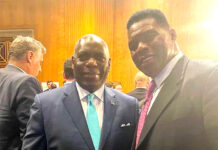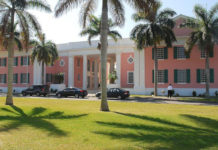Deputy Prime Minister and Minister of Foreign Affairs addressing the Country Support Programme Sub-Regional Workshop of the Global Environment Facility, held at the British Colonial Hilton on Thursday, October 11. Pictured from left is Mr. Symonette; President Barbut of the Global Environment Facility; and Dr. Donald Cooper, undersecretary in the Office of the Prime Minister in charge of the BEST Commission. (Photo: Patrick Hanna)
By: Lindsay Thompson
NASSAU, Bahamas – Addressing the Country Support Programme Sub-Regional Workshop of the Global Environment Facility (GEF) at the British Colonial Hilton this week, Deputy Prime Minister and Minister of Foreign Affairs the Hon. Brent Symonette spoke to a greater need for funding and cooperation within the region to mitigate the effects of climate change.
He added that The Bahamas Government is conscious of its responsibility in the area of environmental protection and is determined to ensure that every effort is being made to implement programmes and policies that will protect and preserve the country’s environment, culture and people while facilitating development.
The GEF is the world’s principal funding mechanism for development and environmental grants for developing countries. The 17 countries represented at the workshop looked at ways to access funding for the preservation of their respective environments.
Mr. Symonette echoed similar sentiments in his recent address to the United Nations, where he also pointed out that climate change is not just a matter of economics but a matter of survival.
“Considering our vulnerability as island nations, therefore, strengthening the support facility to access funding opportunities through the Global Environment Facility at the regional and national levels is one that is timely and an emphasis well placed,” he told the regional workshop’s delegates.
He added that climate change however, is only one of the environmental threats facing developing countries and small island states like The Bahamas.
“We also face the rapid loss of our biodiversity in our efforts to bring about economic growth and development of our communities,” Mr. Symonette said. “The challenge for governments remains how to identify ways of increasing meaningful growth and development while maintaining the dignity of the people and the preservation of the environment.”
“What is special about The Bahamas is the still unspoilt environment: the clean, clear waters, the good fishing grounds, the vibrant pine forests, the rich flora and fauna, the small population concentrations and of course – peace loving, friendly people. And this is what attracts tourists and investors to our country,” Mr. Symonette noted.
He noted that the world is experiencing the impacts of climate change and the loss of biodiversity daily. And, that countries are encouraged to work together to provide programmes and mitigation measures needed to face the unique challenges of fragile environments.
“For all of us in this region, resources for adaptation are essential. However, for a country like The Bahamas, even access to funds can prove difficult given our high Gross National Income (GNI),” Mr. Symonette said.
Therefore, he said there is need for greater international cooperation with respect to the development of new adaptation technologies, as well as the transfer of such technologies in support of the sustainable development of SIDS.
“In the Caribbean, we have a history of successfully working together as a region. We are encouraged when we are afforded the opportunity to partner with organisations like the GEF, the World Bank, and other financial mechanisms which assist with sustainable development of our fragile nations,” Mr. Symonette said.








